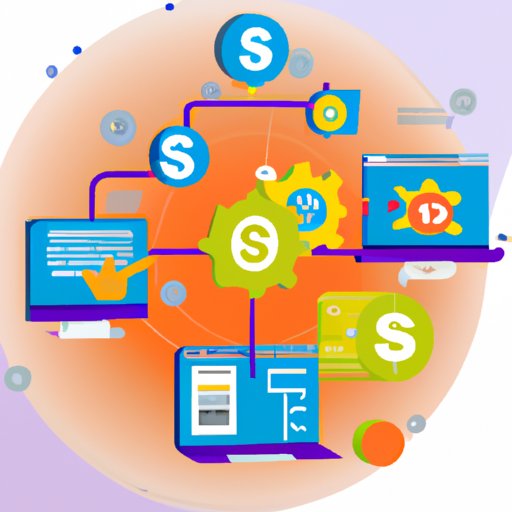Introduction
Small businesses are the backbone of our economy, but managing their finances can be a challenge. Proper accounting is essential for any successful business, whether large or small. Accurate and timely financial information allows entrepreneurs to make sound decisions, comply with tax obligations, manage cash flow effectively, and keep records organized. This article will provide an overview of how to manage small business accounting, from the basics of setting up an effective system to streamlining processes.

Benefits of Small Business Accounting
The advantages of proper small business accounting are numerous. Here are just a few of the key benefits:
Improved Decision-Making
Having accurate financial information at hand allows entrepreneurs to make informed decisions. They can identify areas where they are spending too much money and make adjustments accordingly. Knowing the exact financial position of their business also helps them plan for the future and make investments that will generate the highest returns.
Easier Tax Filing
Keeping track of expenses and income throughout the year makes tax filing much easier. Having all the necessary information in one place ensures that taxes are filed accurately and on time. Accurate tax filing also minimizes the chances of an audit.
Better Cash Flow Management
Having an up-to-date view of cash flow helps entrepreneurs make timely payments to vendors and suppliers. It also helps them anticipate cash shortages and plan ahead to ensure there are enough funds available to cover expenses. Additionally, having good cash flow management in place allows entrepreneurs to take advantage of opportunities that may arise.
Enhanced Record Keeping
Proper accounting helps entrepreneurs keep their records organized. They can easily access information about transactions, invoices, receipts, and other documents. This makes it easier to locate specific documents when needed and to prepare financial statements and reports.
Basics of Small Business Accounting
Before setting up a small business accounting system, it’s important to understand the different types of systems available and which one is best suited to the business. There are two main types of accounting systems: manual and computerized. Manual systems involve manually recording transactions in ledgers and journals, while computerized systems use software programs to keep track of financial information.
Setting Up an Effective Accounting System
Once the type of accounting system has been determined, the next step is to set up the system. This involves creating accounts for each type of transaction, such as revenue, expenses, assets, liabilities, and equity. It is also important to establish a chart of accounts, which is a list of all the accounts used to track financial information. Finally, the system must be regularly updated to ensure accuracy.
Tracking Expenses and Revenues
The key to successful small business accounting is tracking expenses and revenues. Entrepreneurs should create a budget and stick to it. This will help them identify areas where they are overspending and make adjustments accordingly. They should also track all transactions, such as expenses, income, and payments, to ensure accuracy.
Recording Expenses
Entrepreneurs should track all expenses, including those related to operating costs, materials, payroll, taxes, and more. All expenses should be recorded in the appropriate account. It is also important to keep detailed records of all receipts and invoices.
Recording Revenues
Revenue should also be tracked and recorded in the appropriate account. This includes income from sales, services, investments, and more. Detailed records of all sales and invoices should also be kept.
Tracking Payments and Receivables
It is important to track all payments made and receivables due. This helps entrepreneurs manage cash flow and plan for future expenses. It also allows them to identify any discrepancies between what they have paid and what they are owed.
Streamlining Accounting Processes
To reduce the amount of time spent on accounting tasks, entrepreneurs should look for ways to streamline the process. Here are some tips for doing so:
Automating Processes
Using accounting software can automate many of the tedious tasks associated with small business accounting. This includes generating invoices, tracking payments, preparing financial statements, and more. Automation can save time and effort and allow entrepreneurs to focus on other aspects of their business.
Utilizing Cloud-Based Tools
Cloud-based accounting tools are becoming increasingly popular among small businesses. These tools allow entrepreneurs to access their data from anywhere and collaborate with their accountant or bookkeeper in real time. This eliminates the need to store data on local computers, making it easier to manage finances remotely.
Outsourcing Services
For businesses that don’t have the resources to manage their own accounting, outsourcing services can be a cost-effective solution. Outsourcing can help businesses save time, money, and stress by allowing them to focus on their core operations instead of dealing with complicated accounting tasks.
Conclusion
Small business accounting is essential for running a successful business. It helps entrepreneurs make better decisions, file taxes easier, manage cash flow more effectively, and keep records organized. By understanding the basics of setting up an effective accounting system, tracking expenses and revenues, and streamlining processes, entrepreneurs can stay on top of their finances and maximize their profits.
Title
Managing Small Business Accounting: Benefits, Basics, and Streamlining Processes
Keywords
small business accounting, benefits, basics, streamlining processes, decision-making, tax filing, cash flow management, record keeping, automating processes, cloud-based tools, outsourcing services
Description
This article explores the importance of small business accounting, including the benefits it provides, basics of setting up an effective system, tracking expenses and revenues, and streamlining processes. Learn how to improve decision-making, simplify tax filing, and enhance record keeping with small business accounting.
(Note: Is this article not meeting your expectations? Do you have knowledge or insights to share? Unlock new opportunities and expand your reach by joining our authors team. Click Registration to join us and share your expertise with our readers.)
